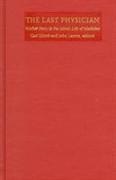Read more
"The Last Physician "offers the pleasure of Walker Percy's companionship in leading an examined life. The authors talk with and through Percy's characters about medicine, about art and suffering, and about how their lives became richer as they acknowledge their share of the world's troubles."--Arthur W. Frank, author of "At the Will of the Body: Reflections on Illness and the Wounded Storyteller: Body, Illness, and Ethics"
List of contents
Acknowledgments ix
Introduction/ Carl Elliot 1
Dr. Percy's Hold on Medicine/ Robert Coles 9
The Act of Seeing with One's Own Eyes/ Ross McElwee 16
Why Doctors Make Good Protagonists/ John Lantos 38
From Eye to Ear in Percy's Fiction: Changing the Paradigm for Clinical Medicine/ Martha Montello 46
Prozac and the Existential Novel: Two Therapies/ Carl Elliot 59
Ethics in the Ruins/ David Schiedermayer 70
Walker Percy and Medicine: The Struggle for Recovery in Medical Education/ Richard Martinez 81
Now You are One of Us: Gender, Reversal, and the Good Read/ Laurie Zoloth 96
Inherited Depression, Medicine, and Illness in Walker Percy's Art/ Bertram Wyatt-Brown 112
Pathology Rounds with Dr. Percy: The Modern Malaise, Its Causes and Cure Brock Eide 134
Walker Percy, Reluctant Physician/ Jay Tolson 150
Afterword: Writing and Rewriting Stories/ John Lantos 160
Contributors 163
Index 165
About the author
Carl Elliott is Associate Professor of Pediatrics and Bioethics at the University of Minnesota. He is the author of A Philosophical Disease: Bioethics, Culture, and Identity and The Rules of Insanity: Moral Responsibility and Mental Illness.
John D. Lantos is Associate Director of the MacLean Center for Clinical Medical Ethics at the University of Chicago. He is the author of Do We Still Need Doctors? and coeditor of Primum Non Nocere Today.
Summary
Walker Percy brought to his novels the perspective of both a doctor and a patient. This collection of essays explores not only Percy's connections to medicine but also the under-appreciated impact his art has had - and can have - on medicine itself. It is suitable for those concerned with medical ethics and the human side of doctoring.

